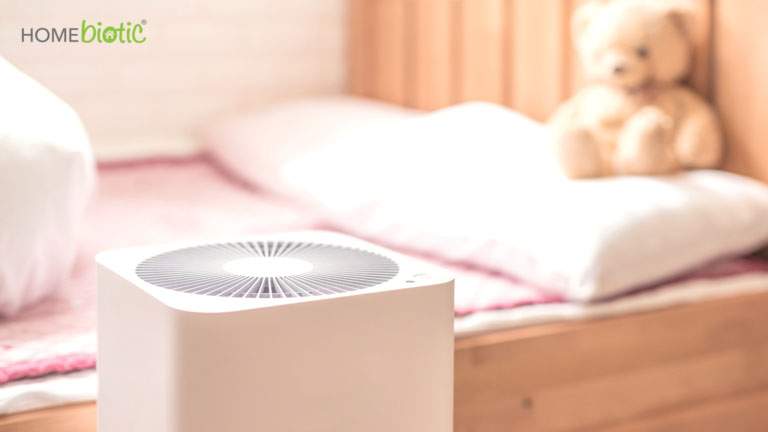
Household mold is a costly and sometimes serious health hazard. Besides the uncomfortable musty smell, mold can cause a variety of health problems if left untreated. The best way to get rid of mold is to hire a professional mold remediation company as the process can be challenging and also a bit dangerous. Some species of mold can’t simply be wiped away and require more expertise to remove. This is especially important in the case of black mold, which is a very toxic and dangerous type of mold. But, what about mold and air purifiers?
Fortunately, an air purifier can help with a mold problem as well. Although they can’t fix mold that is settled and growing on household spaces, they can remove spores and with the right unit, they can actually kill the spores. This makes air purifiers for mold a great help. But even more so, they are fantastic for preventing any future mold problems. In this article, we’ll answer some popular questions regarding air purifiers and how they can help with mold growth.
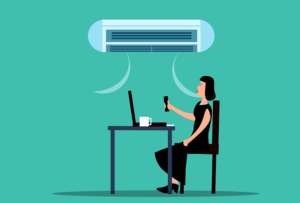 Do Air Purifiers Work?
Do Air Purifiers Work?
Air purifiers help freshen the air in the room by removing toxic particles, allergens, and pollutants. Sometimes they are combined with dehumidifiers to keep the moisture levels lower in the home. An air purifier can remove mold spores, dust, and other pollutants to enhance the cleanliness of the air and reduce allergies and other health problems. There are many types of air purifiers and some work better than others for microbes such as mold.
Are air filters the same as air purifiers?
Air filters only clean the larger particles in the air such as dust and dander. However, air purifiers will sanitize the air using ozone, heat, negative ions, or UV and UV-c light. Most air purifiers also have a filter to remove those large particles. However, some air filters don’t have a purifying mechanism and thus just filter the air of large particles like dust.
Are there any mold-removing air purifiers?
No air filter or purifier can remove mold that has settled into household items like walls, kitchens, bathrooms or furniture. This means that an air purifier doesn’t work on its own to fix a mold issue. However, once mold has been cleaned and removed from the house, an air purifier can prevent mold from returning. Air purifiers can help remove spores and some models can actually burn up the spores completely.
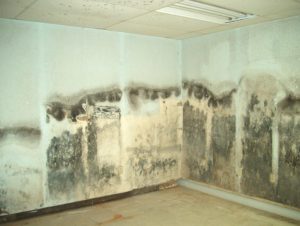 How Can An Air Purifier Help With Mold?
How Can An Air Purifier Help With Mold?
An air purifier equipped with a proper HEPA filter or carbon filters can keep mold spores from circulating in the air. This is one step to help reduce mold problems. Also, some air purifiers can help reduce the moisture in a home which is also helpful. However, it’s important that an air purifier has a good filtration system, which we will talk more about below. People with health effects from mold exposure can benefit from the use of air purifiers for mold.
Can an air purifier kill black mold?
Air purifiers don’t actually kill mold of any kind, but they do trap small invisible mold spores that are buoyant in the air. This means it can prevent those spores from settling in other spots and growing more colonies. Air purifiers with a HEPA filter or activated carbon filter can remove spores from room air.
The only way to kill black mold is to consult with a professional that provides mold remediation. A black mold problem can be very serious and cause many symptoms such as asthma, skin irritation, and other serious health effects. It’s best to have help in removing black mold from your home. But an air purifier can definitely help reduce black mold spores to prevent any further contamination of the home.
What Kills Mold Spores In The Air?
There are no instruments or products that can kill mold spores while they’re circulating in the air. However, air purifiers that have UV light or UV-c light can suck up mold spores from the air and into the purifier unit where they are killed by the UV light.
Do Air Purifiers Remove Mold Spores?
Yes, most air purifiers can remove mold spores and trap them in the filter. It’s best to use a true HEPA filter with a UV-c light as it is the best air purifier on the market. Filters with UV light can make a big difference in reducing mold spores.
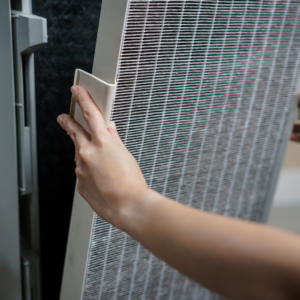 Do Mold Spores Grow Inside Air Purifiers?
Do Mold Spores Grow Inside Air Purifiers?
Unfortunately, yes, mold spores can begin to erode the filter. This can happen even with the best true HEPA filters. This is why it’s recommended to find one with a UV light or UV-c light. HEPA filters don’t actually kill mold spores so they can build up and start growing right in the filter. This can be a serious issue because many people don’t realize that mold can grow inside air filters and purifiers as well. Once mold takes hold in the filter of any one of these units, the unit will begin to circulate mold spores in the room which defeats the purpose of the purifier. Always check and clean air purifiers well and consider getting one with UV light if you have or have had a mold issue.
Are Air Purifiers For Mold Covered By Insurance?
If an air purifier has been deemed medically necessary by a medical professional then many insurance companies will cover it. However, you should check with your individual plan to be sure that an air purifier has the capacity to be covered with that plan. Doctors will often deem an air purifier necessary if there have been serious health effects from mold or other household toxins and pollutants. People with health problems like allergies, asthma symptoms, pulmonary fibrosis, or mold sensitivities may require a medically necessary air purifier.
My home doesn’t have mold, do I need an air purifier?
Mold is a very common household issue causing many health effects. Mold can grow in any home at any time if the conditions are right. If you don’t have mold growing in your home then that is good news. Air purifiers do more than reduce mold, they freshen up a home, remove toxins and other pollutants.
How do I know if I need an air purifier?
Air purifiers are often a matter of personal preference. However, if you or your family suffers from health problems related to air quality in the home then an air purifier would be highly recommended. Health problems that often prompt the need for an air purifier are allergies, asthma, breathing issues, headaches, or autoimmune diseases that are triggered by allergens. Also, if your home has a musty smell or has had issues with mold in the past, it’s highly recommended that an air purifier be kept in areas where problems have been noted.
Do you need an air purifier in every room?
It’s not necessary to place an air filter or purifier in every room. Instead, choose the best place where you feel the air quality needs more help. It’s also possible to move air purifiers from room to room if you wish to freshen the air in all rooms. Of course, if you own a large home, you may need two air purifiers to capture the problem areas in a large space.
Deciding which room to place an air purifier comes down to choosing the most problematic area. Be sure not to place too close to walls, furniture, or other electrical units. Sometimes people are tempted to place an air purifier right next to a problem area, but the unit will need space to pull in air and do its job.
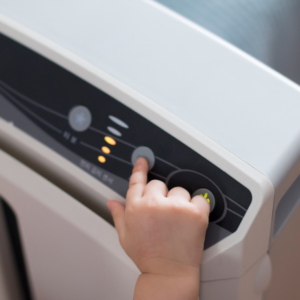 Do I Need A HEPA Filter For Mold?
Do I Need A HEPA Filter For Mold?
A HEPA filter is an efficient filtration system that can help reduce mold spores circulating in the air. HEPA stands for high-efficiency particulate arresting or high-efficiency particulate air. A true HEPA filter is considered the best air purifier on the market. It is also a good air purifier for mold. However, it won’t kill mold so you may need an air purifier that also contains a strong UV light or UV-c light. A UV light takes things one step further and can literally fry mold spores.
What is a true HEPA filter?
There are HEPA-type filters and then true HEPA filters. The main difference is in the efficiency of the filtration system. A true HEPA filter works almost 100% and can grab extremely small particles that a HEPA-type filter can’t grab.
What is the best air purifier for mold and mildew?
The best air purifier for mold in your house is a true HEPA filter with a UV-c light. Not only can this filter trap spores and remove them from the air, but it can also kill off spores so they don’t lodge in air purifier filters. Unfortunately, mold can damage filters if too many spores build up inside the HEPA filter system. Having a HEPA filter with UV-c light is the best solution as it will reduce mold spores and kill them.
Mildew is generally less harmful than mold even though it is a type of fungi as well. It usually grows on wet surfaces like kitchen and bathroom tiles and in moist corners where water builds up and remains. In this case, an air purifier can help with circulating spores but can’t actually remove mildew. Removing mildew is easy and requires a simple wipe using hydrogen peroxide or just vinegar and water.
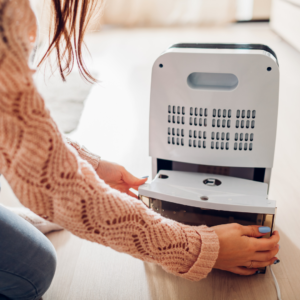 What’s Better For Mold, An Air Purifier, Or A Dehumidifier?
What’s Better For Mold, An Air Purifier, Or A Dehumidifier?
Air purifiers and dehumidifiers are two very different pieces of equipment. Often you can find units that have both an air purifier and a dehumidifier built-in. But they are also sold separately. An air purifier cleans the air whereas a dehumidifier removes excess moisture from the air. Both mechanisms are important in treating and preventing mold.
Mold needs the following circumstances in order to grow: food, moisture, and free space without competition. Mold grows by emitting spores into the air that settle on surfaces and multiply. Air purifiers can help grab mold spores out of the air before they settle anywhere. As we said above, it’s not the only way to prevent mold, but it certainly helps when the problem is simple or in a preventative manner. Dehumidifiers help reduce mold by taking excess water out of the air and surrounding items. This robs mold spores of the moisture that they need in order to grow. So as you can see, a combination of both an air purifier and dehumidifier can really help reduce and prevent mold.
How Important are air purifiers in reducing or preventing mold growth?
Air purifiers, especially those with a UV light or UV-c light, can be invaluable in reducing or preventing mold. However, one should never rely solely on air purifier units. Instead, adopt a more broad approach by preventing all the conditions necessary for mold to grow. Remember that mold needs space, food, and moisture so anything that can be done to prevent those conditions will help reduce and prevent mold and mold spores. Some ways to do this are: use fans, open windows, keep air circulating in the home, fix water leaks, prevent water build up, and remove food sources around moist areas. All of these measures plus the addition of an air purifier will help reduce and prevent mold spores and mold growth.
 Conclusion
Conclusion
Air purifiers can be a very beneficial investment when you want to reduce or prevent mold issues in your home. Although they can’t fix an established mold problem, they can certainly help with removing and reducing mold spores and improving air quality. Be sure to find air purifier products that have a UV or UV-c light as this is the best way to actually kill mold spores not just trap them in the filter. Remember that filters can get overrun with mold too which is why UV light is more effective.
In short, air purifiers can be a really helpful part in preventing mold growth and mold spores. If you’ve ever had a mold issue or you have family members with mold-related allergies or illnesses, it would be very beneficial to do some market research and get the right air purifier for your home.
References
https://www.epa.gov/mold/what-difference-between-mold-and-mildew#:~:text=Mildew%20refers%20to%20certain%20kinds,of%20multicellular%20filaments%2C%20called%20hyphae.
https://pubmed.ncbi.nlm.nih.gov/25007943/
https://www.ncbi.nlm.nih.gov/pmc/articles/PMC4206797/
https://www.ncbi.nlm.nih.gov/pmc/articles/PMC3165134/
https://pubmed.ncbi.nlm.nih.gov/3631655/
https://www.ncbi.nlm.nih.gov/pmc/articles/PMC7277583/
https://www.ncbi.nlm.nih.gov/pmc/articles/PMC4587002/
https://pubmed.ncbi.nlm.nih.gov/16268830/




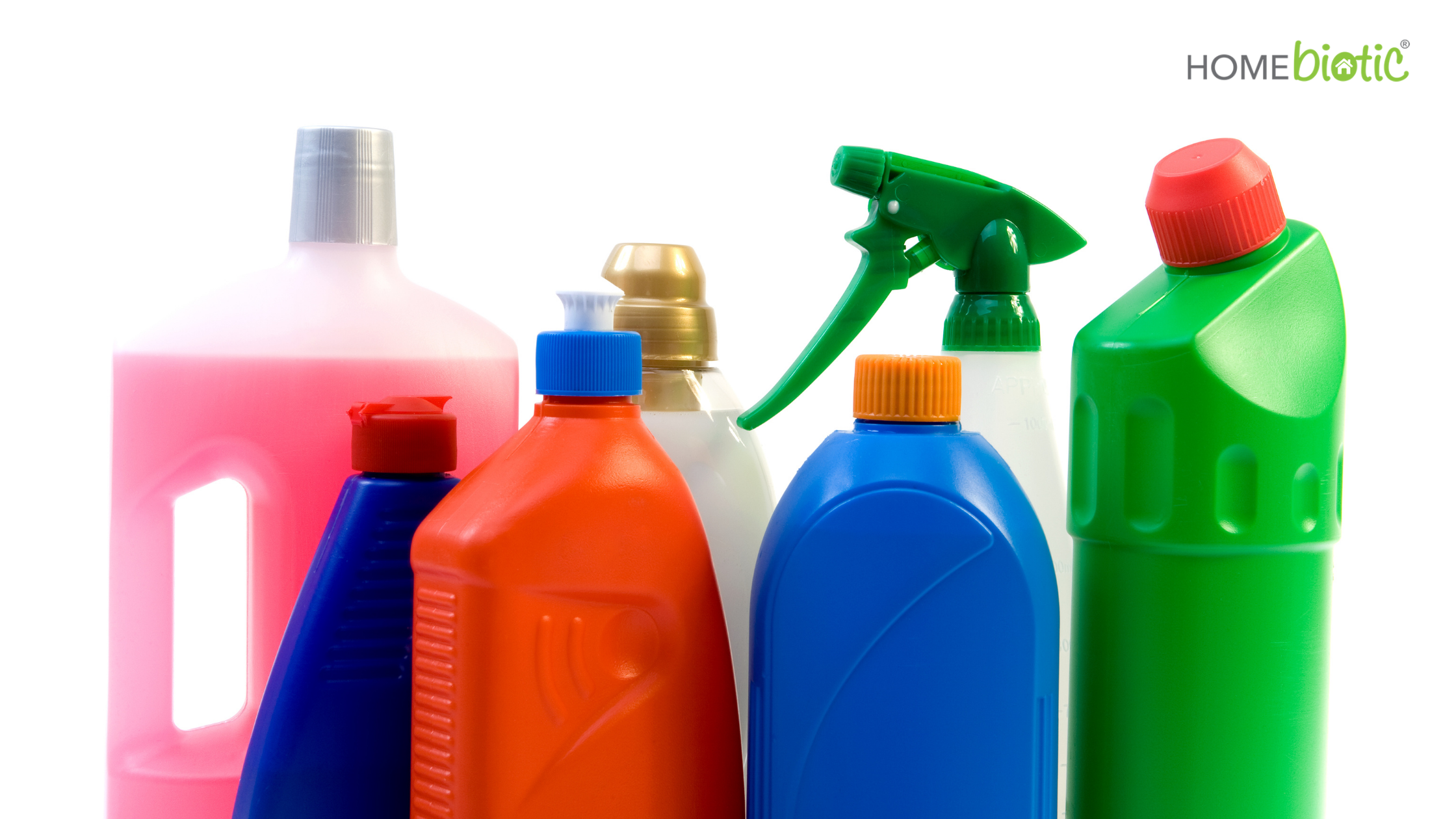

 Why Are Some Cleaning Products Harmful To The Environment?
Why Are Some Cleaning Products Harmful To The Environment? How Modern Cleaning Products Affect The Environment?
How Modern Cleaning Products Affect The Environment?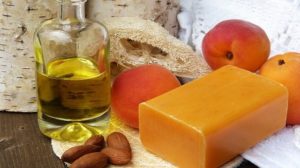
 Why Is It Important To Not Over-Clean Our Homes?
Why Is It Important To Not Over-Clean Our Homes?
 Do Air Purifiers Work?
Do Air Purifiers Work? How Can An Air Purifier Help With Mold?
How Can An Air Purifier Help With Mold? Do Mold Spores Grow Inside Air Purifiers?
Do Mold Spores Grow Inside Air Purifiers? Do I Need A HEPA Filter For Mold?
Do I Need A HEPA Filter For Mold? What’s Better For Mold, An Air Purifier, Or A Dehumidifier?
What’s Better For Mold, An Air Purifier, Or A Dehumidifier?